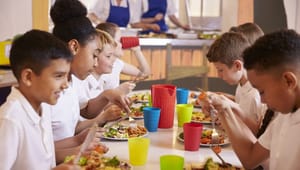Regenia Phillips: The Can-do GalRegenia Phillips: The Can-do Gal
As the head of dining services at the University of North Texas, Phillips has used value meals and effective marketing to increase sales by 19%; given staff growth opportunities; introduced affordable catering; opened a new resident dining facility, and the list doesn't end there.
August 23, 2005
At a Glance
Accomplishments
Regenia Phillips has created a foodservice department at the University of North Texas (UNT) in Denton that is known throughout the campus and its community as a "can do" operation. Present Phillips, director of dining services, with a challenge; from broadening the career horizons of her staff of 120 full-time employees plus 300 to 400 student workers, to stepping in to handle major sports concession commitments when the prior vendor was let go and the challenge will be met with grace, style and an over-the-top effort.
Or give her the go-ahead to create a cutting-edge dining venue in a brand new, $6.5 million cafeteria that's not only across the campus but also across a highway, and she and her team will execute it so well that customers not only pack the location but clamor for the other five on-campus facilities to follow the model, as reflected in online surveys and comment cards.
UNT enrollment is currently 33,000 and rising. It's primarily a commuter campus with 4,800 students on a board plan. Overall, approximately 35,000 meals are served per week, excluding catering, in six venues serving the board plan customers. (Sodexho runs retail operations on campus.)
Profitable meal-deal: To increase participation, Phillips has heavily marketed a faculty/staff meal-deal through e-mail messages that hype "great food, great desserts."
Ten meals, paid in advance, are priced at $3 dollars per meal, "so we get a lot of participation," she reports. "Our overall enrollment has continued to climb over the last six years and with it our participation. We now serve about 1 million meals per year and our increase last year over the previous year was 14%. One of the key drivers of those meals is our faculty/staff meal plan. We sold $27,000 in faculty/staff meals the previous year, but last year we sold $34,000, an increase of 19%, and we're on target to exceed that."
She also aims to drive participation numbers through budget catering for departments that just want to pick up coffee and desserts. "The cost is low on those items for the departments. We've always had it, but I've tried more recently to increase the business," she adds.
Phillips took over the department in April 1996, having spent the previous 15 years at Southern Methodist University in Dallas. She found a staff that was "somewhat stagnant, with opportunities for advancement somewhat limited and morale that was mediocre," she recalls. Her immediate objective was to get to know them all, recognize their strengths and inspire them to follow her to the next level.
Channeling potential: "I allow cooks to work in catering to improve their skills and provide management training for supervisors with training done by a home-grown, credentialed culinary trainer who started here as a pot washer," Phillips says. "I think I have a God-given ability to pull out the best in people and help them achieve their highest potential. I can see potential, drive, energy, desire, and I try to place people where they will grow."
In fact, Phillips is proud that staff members "warn" potential employees that they have to be flexible to work for her, and she readily admits there's been change in the department not just for the sake of change, but rather for the benefit of both the employees and the university.
Phillips ranks high on her list of achievements the opening of Champs cafeteria last fall in conjunction with a 600-bed residence hall and an athletic center. "Students can go to any location, but this one is unique, with access only by car or campus bus," she says. "Most commuter students are masters or doctoral candidates and they don't eat on campus. Every location has to recognize where they are. Of course, we would like to grow the cash op which is contracted and not hugely successful."
The centerpiece of Champs is a six-foot-long grill with hood, the first live-action area students see as they enter. This cook-to-order station features grilled chicken breast and Philly cheese steaks among the numerous choices. As the line curves around, other offerings present themselves: baked-to-order pizzas, specialty soups, traditional home-style items, and more.
The locale exudes a polished welcome, from the stained concrete floor and open ceiling to the built-in bar along the entire south wall of windows where students can sit on high stools and view the activities on a sports practice field while they dine.
Late-night option: Overall, the department provides continuous service from 7 a.m. to midnight. Most locations close at 7 or 8 p.m., but the Clark Grill is the "cool hangout" from 5 p.m. to midnight. A big screen TV and video games add to the ambiance, but the Asian chef and his repertoire of stir-fries is the real draw, along with a menu that includes smoothies, hot dogs, pizza, soups and a salad bar.
Over the years, Phillips has learned that when there's a need for outreach from the university, it usually involves food. "I don't keep track of how much we give," she admits. "For example, we charge half-price for food for campus recruitment, 6,000 to 8,000 (prospective students per year). And, we donate the food given to participants in fund raisers such as the American Heart Association Walk."
The concession challenge: Since June, Phillips and her staff have also become the concession provider for athletic events held on campus. They've been called upon to source items, determine the menu and handle pricing, inventory control, food preparation and selling.
"Providing food for students in a cafeteria is different from providing food to concession customers," she points out. "Trying to figure out how much to order is a challenge when we're estimating between 10,000 to 15,000 attendees, as we are for the finals of the basketball Shoot Out that will end up at our coliseum, The Super Pit."
"We're recruiting from our full-time and part-time workers to help out with the concessions," she adds. "We definitely hope it will be profitable, at least to cover our labor and food cost. If we make a profit, we'll be ecstatic. Our efforts build a sense of community."
This semester, Phillips plans to help the Athletic Department's tailgating initiative, an effort to grow advance sales of game-day meals to students and alumni. "We'll have their order at the time they specify, available at our Mean Green Village tent," she promises. "We'll bring the items cooked or uncooked. For example, we'll provide fried turkeys or we'll sell them a turkey to cook in the parking lot or in the tailgating area at the edge of the field."
Phillips is so passionate about food and UNT foodservice, she just might be found on an event weekend grilling up her own specialty of the house: an "awesome" salmon recipe (lemon juice, Dijon mustard, bread crumbs and butter) in the tailgating area.
About the Author
You May Also Like
.jpg?width=300&auto=webp&quality=80&disable=upscale)



